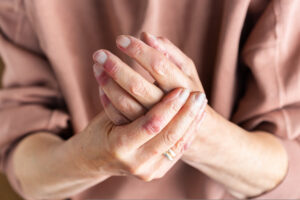Articles
By Hope Hamashige
Published On: Aug 27, 2024
Last Updated On: Sep 12, 2024
The National Eczema Association (NEA) is the largest private nonprofit funder of research for adult and pediatric eczema, investing more than $4 million to date. Ever wonder what exactly our research grant recipients are working on? Under the Microscope is where we provide an inside look at research from one of our latest grant recipients, including what they are studying and its potential impact on the eczema community.
Is the salt in your food causing your eczema?
It is very clear that eating too much salt can send blood pressure soaring and damage the heart or the kidneys. But can too much salt also cause outbreaks of eczema for some people?
Although salt is generally not mentioned when dermatologists rattle off common eczema triggers, Dr. Katrina Abuabara, associate professor of dermatology and epidemiology at University of California, San Francisco, noted that there is some evidence that a high-sodium diet could be an overlooked cause.
Dr. Abuabara explained that one very small study of only eight people found that people with eczema have as much as 30 times the amount of salt in their eczema lesions than people without eczema. But whether there is a connection between salt in the diet, which is stored in the skin, and eczema has not been studied in a rigorous way using large and robust data.
That was until the National Eczema Association funded Dr. Abuabara’s research on eczema and high-sodium diets through an Eczema Champion Research Grant in 2021.
“I don’t think it will explain every case of atopic dermatitis, which is a very heterogeneous disease, but it might explain some cases, particularly among people who are sodium sensitive,” said Dr. Abuabara. “It may be that eating a low-sodium diet could be a fairly simple intervention for some people with eczema.”
A rigorous examination
To evaluate the connection between high-sodium intake and eczema outbreaks, Dr. Abuabara is using data collected through the UK Biobank, a population-based cohort that includes over 500,000 participants in the United Kingdom. The biobank contains detailed records of sodium intake and through linked electronic health records, Dr. Abuabara can identify those people with an eczema diagnosis and determine the severity of the case.
Dr. Abuabara’s preliminary conclusions, which will likely be published in 2024, show that people who consume high-sodium diets have a higher risk of developing eczema. The research also showed that people with the highest-sodium diets had a higher risk of severe eczema.
She is also evaluating whether the connection between salt and eczema is more prevalent among certain groups of people, including women and older adults, who are known to have higher sensitivity to excess sodium intake.
That same database also contains genetic information, which Dr. Abuabara plans to use in the next phase of her research, also funded by NEA in 2023. In the next phase, which she expects to begin in late 2024, she will look at genetic information as well as several lifestyle factors, including eating a high-sodium diet, to try to understand why and how several studies have found a connection between eczema and cardiovascular problems, such as hypertension and coronary artery disease.
Triggers remain an important research question
Even as new treatments for eczema have come to market in recent years, Dr. Abuabara said it remains important to understand the triggers that set off a flare of the disease in the first place. She noted that the new medications do not prevent outbreaks, only the resulting inflammation, and, because the disease is so heterogeneous, the newer treatments do not work on every person.
Rigorous research into the lifestyle and environmental factors that trigger the disease can lead to relatively straightforward changes, resulting in positive outcomes for many people.
“One of the great challenges for most people with eczema is not having solid recommendations about keeping their triggers at bay,” said Dr. Abuabara. “If we discover that a high-sodium diet can lead to outbreaks, for example, we can give patients a cost-effective, low-risk lifestyle modification that may help them prevent future outbreaks.”
NEA grants and their impact
NEA is dedicated to increasing the number of scientists, research projects and research dollars devoted to eczema, in pursuit of better therapies, better care, better outcomes —and one day, potentially, a cure. Learn more about our eczema research grants, their impact and how you can get involved.






